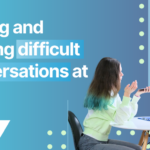Staying organised is a vital skill in almost any job or course of study. Most of us will have lots of different and conflicting priorities on our plate at a time, and need to find a way to juggle those. Now that more people than ever are working from home, staying organised is even more essential. Without the accountability of your boss checking on you throughout the day, it can be easy to lose focus and shift into a pattern of being disorganised.
One of the most useful tools for helping you stay organised isn’t a planner, a to-do list, a Trello board, or a daily call with your boss. It’s something that exists purely in your mind and that you can control: self-awareness.
What is self-awareness?
Self-awareness is a subcategory of emotional intelligence. Emotional intelligence expert Daniel Goleman defines it as a combination of emotional awareness, accurate self-assessment, and self-confidence.
In other words, a self-aware person can recognise and understand their own emotions and accurately assess their strengths and weaknesses, while having a strong foundation of self-esteem.
Recognise how you’re feeling each day
Try taking five minutes out at the beginning of each day or work shift to ask yourself “how am I feeling today?” [Link to “temperature check” piece.] Simply paying attention to your emotions and recognising how you’re doing without judgement can make a big difference.
Once you recognise how you’re doing, plan your day accordingly. If you are starting the day well-rested and raring to go, tackle the most difficult jobs first. On the other hand, if you’re feeling stressed out or tense, consider easing into your day with less taxing work before you start on the more challenging tasks.
Pay attention to your most common distractions
Part of self-awareness is understanding your weaknesses. In the context of staying organised, this might mean knowing what tend to be your most common distractions or procrastination tactics. Once you know what they are, you can take steps to mitigate them.
Do you plan to check Facebook “just for five minutes” and then find yourself still scrolling mindlessly an hour later? Consider using an app to block social media or limit your usage during working hours. Or do you tend to check your email multiple times per hour, breaking your focus? If so, you might want to pick designated times to check your email throughout the day and leave it alone the rest of the time so you can focus on more productive tasks. No-one is going to die if you don’t reply to that email from Accounting within two minutes, I promise.
Notice when your attention starts wandering
What does it feel like when your attention starts to wander? Notice that, and pay attention to it. Do you start thinking about other things? Do you start to feel fuzzy headed and find it difficult to focus on your work? Knowing how to recognise when your attention is starting to wander is the first step to getting back on track quickly.
Human beings aren’t supposed to concentrate for hours at a time without a break. Therefore, you may find that when your attention slips, it’s time to take ten minutes away from the computer. Grab a cup of coffee, do a few stretches, or reward yourself with a short social media break. Then dive back into work.
Learn what organisational strategies work for you
I run my life with an intricate system of a paper planner, Trello boards, a Google Calendar, and Post-It notes. Sounds complicated? It is, but it works for me. It might not work for you! Part of self-awareness is trying out different strategies and learning what works for you.
If you don’t know, don’t be afraid to experiment. What keeps you organised? Whether it’s a to-do list, an organisational app, calendar blocking, a bullet journal, or something else entirely, there’s no right answer. The trick is to learn what works for you and then do that.
Place realistic expectations on yourself
A critical component of self-awareness is knowing your own limits. We’re all human and we all have different capacities on any given day (and it can vary from day to day, too.) Putting unrealistic expectations on yourself will lead to stress, burnout, and feeling like a failure.
Therefore, if you have the time and energy to do five things today, pick five things and prioritise those. Don’t put ten things on your to-do list and then feel bad about yourself when you inevitably can’t do them all.
Having high expectations of yourself and holding yourself to high standards is a good thing. But they must be realistic.
Pro tip: don’t consider your limits as a weakness. They’re not, they’re part of what makes you a person. By being aware of them, you can plan to achieve the things you want and need to achieve, without putting yourself through unnecessary stress.
Know that you’re awesome
Because you are!
The last component of self-awareness is self-esteem. This can be defined as a basic sense of your own worth.
You’ll have good productivity days and bad productivity days. You’ll have days where you feel so organised you could take on the world, and others where you feel completely scatterbrained. This is normal! The point isn’t to be perfect, but to strive to do your best. By learning the tricks we’ve outlined for you here, you can do exactly that.
Exercise: getting to know yourself with 10 quick questions
Sit down with a pen and paper (or a keyboard, if you prefer.) Write down the answers to these questions. No-one else is going to see these answers, so be as honest as you possibly can.
Today I feel….
- My greatest strength at work is…
- My biggest challenge at work is…
- My greatest strength in life is…
- My biggest challenge in life is…
- My biggest distraction/procrastination strategy is…
- When I am unfocused, I feel…
- What helps me stay organised is…
- One thing I want to achieve this year is…
- One reason I am awesome is…













